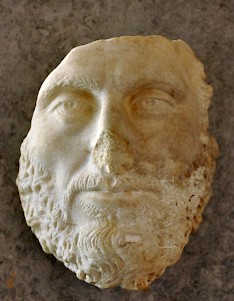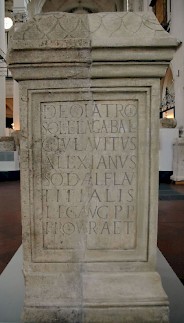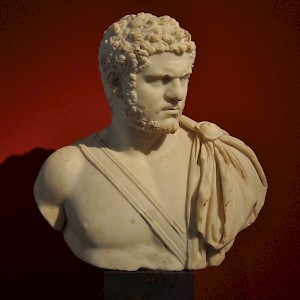Gaius Julius Avitus Alexianus
Gaius Julius Avitus Alexianus (c.155-217): Roman nobleman, husband of the Syrian princess Julia Maesa, father of Julia Soaemias and Julia Mamaea, grandfather of the emperors Heliogabalus (218-222) and Severus Alexander (222-235).

Although Gaius Julius Avitus Alexianus was the father of two empresses and the grandfather of two emperors, we do not know much about him. The Roman historian Cassius Dio tells us that "Julius Avitus" was the husband of Julia Maesa.note She was the daughter of Julius Bassianus, the high priest of the sun god Elagabal of Emesa in Syria. The couple had two daughters, Julia Soaemias and Julia Mamaea, who was a bit younger. Because Soaemias was born in c.180 and wealthy Roman men married at the age of about twenty-five, we may assume that Alexianus was born in c.155.
His curriculum vitae is known from a long inscription that was found in Split in Croatia, ancient Salona.note He started a normal equestrian career: first, prefect of an auxiliary unit of Petraeans; then, tribune in a legion; and thirdly, prefect of a squadron of cavalry: the tres militiae). The next stage was a procuratorship of the food supply of Rome, for which he was stationed in Ostia. Here, Alexianus must have witnessed the coup of his brother-in-law, Septimius Severus (193). At about the same time, his oldest daughter, Soaemias, married to Sextus Varius Marcellus; the marriage between Mamaea and Gessius Marcianus took place a bit later.
The inscription next mentions that he was made a CV, a clarissimus vir, or senator, with the rank of praetor. This must have happened immediately after Severus' coup. He was also made priest of the deified emperor Titus and given the command of the Fourth Legion Flavia, a unit that was normally staying on the Danube but may have taken part in Severus' eastern campaigns (against his rival Pescennius Niger and the Parthian Empire). Later, Alexianus served as governor of Raetia; this may be dated to 196/197.

From these years, we have another inscription, now in the Römisches Museum in Augsburg.note It is a dedication to Elagabal, the sun god of Emesa. It is certainly not the first such monument north of the Alps (cf. the Woerden dedication), but it is still remarkable to find a text referring to a Syrian deity so far away from Emesa.
It was an impressive career, and the crowning achievement was the consulship, which he may have occupied in 198, 199, or 200. After this, there is a gap of several years in his career. It is likely that Severus' right-hand man, Plautianus, opposed Alexianus having office, because he feared the rise of a rival. (Another victim was Alexianus' son-in-law Sextus Varius Marcellus.) During these years, his grandson Varius Avitus Bassianus was born, the son of his daughter Maesa and her husband Varius Marcellus. The boy was to be emperor, called Heliogabalus.
After the fall of Plautianus (205), Alexianus resumed his career and he took part in Severus' British expedition (208-211). In Britain, he must have learned that his youngest daughter Mamaea had given birth to a son, which she and her husband called Alexianus. This boy was to become emperor under the name of Severus Alexander.

The inscription from Split mentions him as prefect of the Italian orphanages during the reign of Severus' son and successor Caracalla (211-217). He repeated this office, and was governor of Dalmatia (c.214). Next, we find him as governor of Asia (c.215-216). He appears to have been with Caracalla during his campaign against the Parthian Empire, but was sent to Cyprus in early 217 as adviser to a governor. On his way, he succumbed to old age.note He never learned that the sons of his two daughters were to rule as emperors.